
[ad_1]
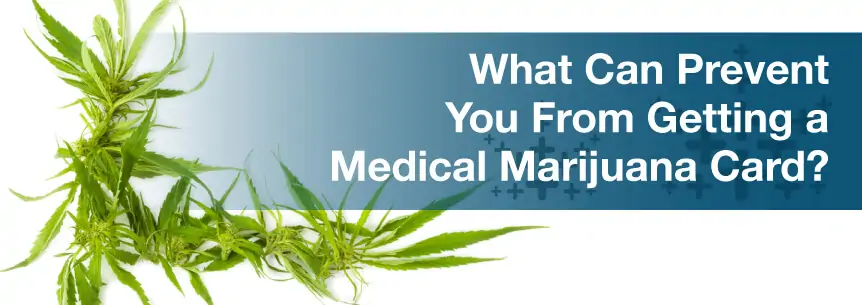
With many states currently legalizing medical marijuana, more people are paying attention to the many health benefits cannabis offers. They’re also wondering what might prevent them from qualifying for or receiving a medical marijuana card.
Because medical cannabis is allowed on a state-by-state basis and the federal government continues to view the use of medical marijuana as an illegal substance, each state creates its policies and laws related to the use and dispensing of medical cannabis. This includes the process by which patients qualify to receive it.

In legal states, the statutes and regulations vary widely as to which conditions qualify for treatment with medical marijuana and what type of cannabis is acceptable to treat various ailments. Rules and regulations in the states where medical marijuana is legal may govern:
Even though many states have legalized medical cannabis, federal law continues to prohibit the use of marijuana. This means you must follow a step-by-step process required by your state to get your medical marijuana card.
Along the way, you might find a few reasons potentially disqualifying you from getting approved. This guide discusses what circumstances could deny you from receiving your medical marijuana card — and what you can do to improve your application so it results in approval.
Reasons You Can Be Denied a Medical Marijuana Card
Whether for various clerical medical marijuana card disqualifications, not having a qualifying condition in accordance within state laws or for a handful of other reasons, you may have your initial application for a medical marijuana card denied. Some of the most common reasons why you might be denied approval include:
- Living in a non-legal state
- Not having a qualifying condition
- Not being old enough at the time of application
- Prior felony charge
- Errors in providing information
- Improperly filled out application
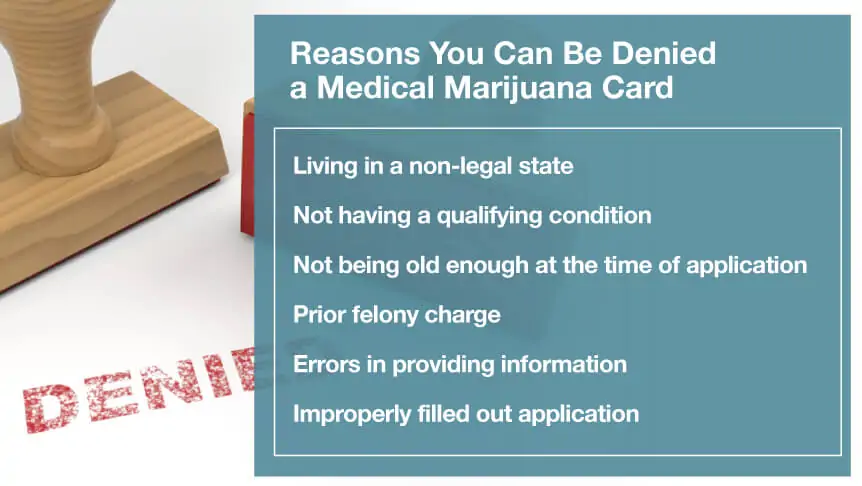
Below we’ll go over in detail the reasons that might prevent you from getting a medical marijuana card. Pay attention to them, as knowing what to watch for can save you time and aggravation in the application process.
Living in a State Where Medical Weed Has Not Been Legalized
While more than half the states in the U.S. allow medical marijuana, many states still do not. If you don’t live in the state where you’re attempting to get a medical marijuana card, the odds are certainly not in your favor of getting a medical marijuana card where you reside.
And very few states allow for reciprocity between states where medical marijuana is currently legal. However, some states currently have some form of reciprocity agreements in place for medical marijuana, including:
Reciprocity means that a state will accept a medical marijuana registration from other states. Even in these states with reciprocity allowances, patients must follow certain stipulations, including possession limits and other restrictions.
If you’re interested in receiving medical marijuana on an out-of-state basis, you must hold a current, valid medical marijuana card from your home state. If you do live in a state where medical marijuana is legal and want to get a medical marijuana card, your driver’s license is often sufficient proof of residency, though you may need additional documentation in some states or circumstances.
Not Having a Qualifying Condition
One of the biggest things that can prevent you from getting a medical marijuana card is failing to have a qualifying condition. Each state legalizing medical cannabis has criteria for conditions and permission. Even if you have a disease or ailment identified as allowable in every state but your own, if it isn’t an acceptable condition for treatment with medical cannabis in your state, your application faces almost certain denial.
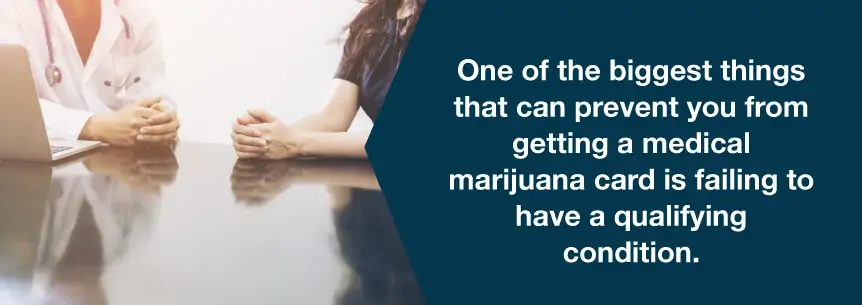
Many states that have legalized marijuana for medicinal purposes include the following conditions among their lists of treatable conditions:
There are other conditions medical marijuana might be beneficial for but aren’t universally allowed. Your state may or may not recognize them for medical marijuana programs at this time. They include:
You medical marijuana doctor plays a key role in evaluating your health issue to determine if it is identified as a qualifying medical condition. We’ll go over some tips for talking to your doctor about using medical cannabis for your situation later in this guide, but keep in mind that the more detailed and open you can be about describing your condition and its symptoms, the better.
Your Age at the Time of the Application
Current law in all 29 states and the District of Columbia for obtaining a medical marijuana card for personal use requires patients to be at least 18 years of age. Different states, though, have differing views on allowing people to get a medical cannabis card for qualifying minors under their care.
Several states allow parents and caretakers of minor children obtain the medical marijuana card on their behalf at the age of 18. These states currently include:
- Arizona
- California
- Colorado
- Connecticut
- Delaware
- District of Columbia
- Oregon
- Florida
- Hawaii
- Minnesota
- Montana
- Nevada
- New Jersey
- New Mexico
- Pennsylvania
- Vermont
- West Virginia
The remaining states require caretakers to be at least 21 to obtain a medical marijuana card on behalf of a minor child, including:
- Alaska
- Arkansas
- Illinois
- Maine
- Maryland
- Massachusetts
- Michigan
- New Hampshire
- New York
- North Dakota
- Ohio
- Rhode Island
- Washington
Understanding these requirements can save parents time and energy by ensuring their applications are filled out appropriately by adults legally permitted to do so in their states.
Prior Felony Charges
Most states have laws preventing people with certain felony charges from working in medical marijuana dispensaries. This is especially true if those convictions were drug-related. While some states do not bar convicted felons from getting medical marijuana cards, others, including the state of Illinois, do if the felony conviction was drug-related.
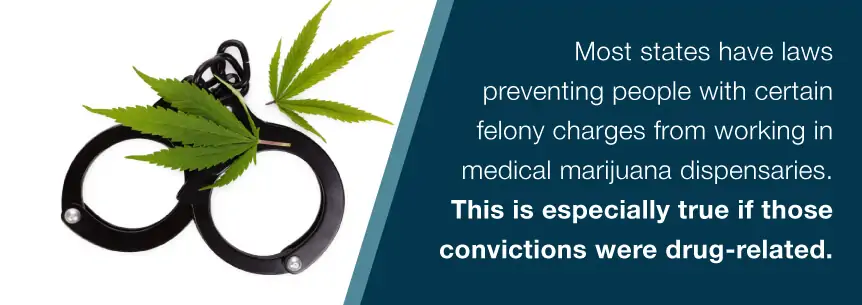
However, even in Illinois, there is some leeway granted if the drug conviction in question was related to obtaining marijuana for medicinal purposes, according to NBC 5 in Chicago.
The key is to check the laws specific to your state if you’re concerned about a previous conviction barring you from approval for a medical marijuana card. The statutes vary a great deal from one state to the next. You’ll need to know the specific regulations in your state, as well as any possible leeway the state provides, to earn an exception.
Errors in Providing Information or Improperly Filled Out Applications
The state of Colorado lists a variety of reasons, mostly related to improperly filled out applications, that could result in medical marijuana card prevention or rejection. They include things like:
- Failing to fill out forms within the appropriate time frame.
- Failing to submit all necessary paperwork.
- Missing some or all of the required information.
- Using white-out or writing over existing information to make corrections.
- Improperly matched signature and notary dates.
- Inactive notary or incorrect information in notarized sections.
- Medical portions filled out by a non-qualifying medical professional.
- Registry database information not matching patient information.
- Submission of outdated forms.
- Files missing physician’s DEA certification.
Denials are separate issues and only issued when applications violate state statute. Denials may occur for the following reasons, though keep in mind that every state has slightly different guidelines:
- Falsified physician recommendations.
- Falsified information on the application.
- ID application and patient ID are different.
- The applicant is not a resident, in states where residency is required.
- Incomplete application
- Previous rejections.
Medical marijuana cards are serious business in the states that have legalized and now permit the use of medical marijuana. Take care to fill out applications for these cards thoughtfully and thoroughly to avoid unnecessary treatment delays or the added scrutiny of rejection or denial.
How Might a Medical Marijuana Card Impact Your Job?
While your job might not prevent you from being allowed a medical marijuana card, using medical marijuana can cause serious issues in a variety of jobs. This is especially true for 4.1 million federal workers who may be subject to drug screening. Using pot can cost you your job, your security clearance, and more. It may even result in the denial of federal retirement benefits.
Other workers, such as truck drivers under the purview of the Federal Motor Carrier Safety Administration, for instance, may face significant consequences if caught performing their jobs while under the influence of medicinal marijuana, which the federal government classifies as a Schedule I controlled substance. Truck drivers, under current regulations, are prohibited from being in “possession of or under the influence of any Schedule I controlled substance while on duty.”
In fact, if you’re in an accident while operating a truck in a professional capacity and under the influence of weed, your insurance may deny the coverage, leaving your open to crippling financial liability in the aftermath of the accident.
What Can You Do If Your Medical Marijuana Card Is Denied?
Now that you know what can prevent you from getting a medical marijuana card, it’s time to turn your attention to what your next steps are if you get denied a medical marijuana card — and feel your denial was in error. Different states have different policies, but most are similar to what the state of Colorado has in place. People who have had applications rejected will receive letters explaining the reasons for the rejection and the steps necessary to correct the issues causing the rejection.
You have a certain number of days, which varies by state, in which to turn in a new application along with another application fee with the correct and complete information. Each patient has different needs, circumstances and resources available. Getting the application right the first time can save you from paying a fee a second time or eliminate the risk of an outright denial.
Take your time, make sure you have all the appropriate documentation and deal with qualified healthcare and notary professionals to ensure you only need to go through the medical marijuana card application process once.
Discussing Medical Marijuana With Your Physician
If you believe your condition qualifies or may qualify under laws in your state for treatment with medical marijuana, the next step you must take is discussing your beliefs with your physician.
Because not all physicians advertise their views on medical marijuana, it may feel awkward bringing up the issue. However, it’s necessary for people interested in exploring all options for safeguarding their health and maximizing the quality of life with a variety of illnesses. And because the doctor is the one who submits their recommendation for your approval for medical marijuana, you want your physician in your corner.
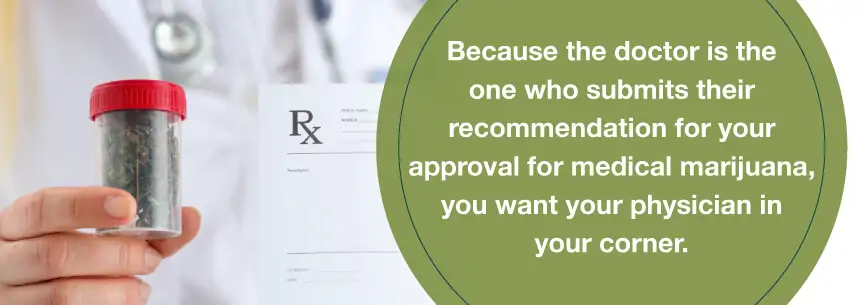
If you don’t feel comfortable broaching the topic with your current physician, it may be time to consider a different doctor — one you’ll feel more confident and comfortable confiding in. These steps will help you have productive and informative discussions about medical marijuana with your doctor:
- Arm yourself with the facts about medical marijuana. Bring case studies, information about the laws in your state, and information on how others with the same illnesses use medical cannabis to treat their conditions and manage their symptoms effectively.
- Bring your questions along. This lets your doctor know you are seriously exploring your options while keeping an open mind.
- Ask your physician if they have other patients who have used medical cannabis. Ask whether it has successfully managed symptoms or provided relief from illnesses like yours.
- Accept it if your physician says they simply don’t know enough to have a conversation. Ask for recommendations or referrals to physicians who may have the answers you seek. More than 80 percent of physicians believe they need more medical knowledge and training before recommending pot to their patients.
Some physicians are taking steps to educate themselves. Often, though, they need the right encouragement from their patients to get serious about research and learning what they need to know so they can better advise their patients about medical marijuana. The more patients like you who pursue pertinent information about the viability of medical cannabis as a treatment option, the greater sense of urgency physicians will feel about obtaining the information necessary to help you make informed decisions about your treatment options.
Learn More About Getting a Medical Marijuana Card
Marijuana Doctors offers you comprehensive resources to help begin the process of getting your medical marijuana card, including:
Explore our site to find answers to your questions about medical marijuana and more. Get started on securing your pot card today.
[ad_2]
Source link